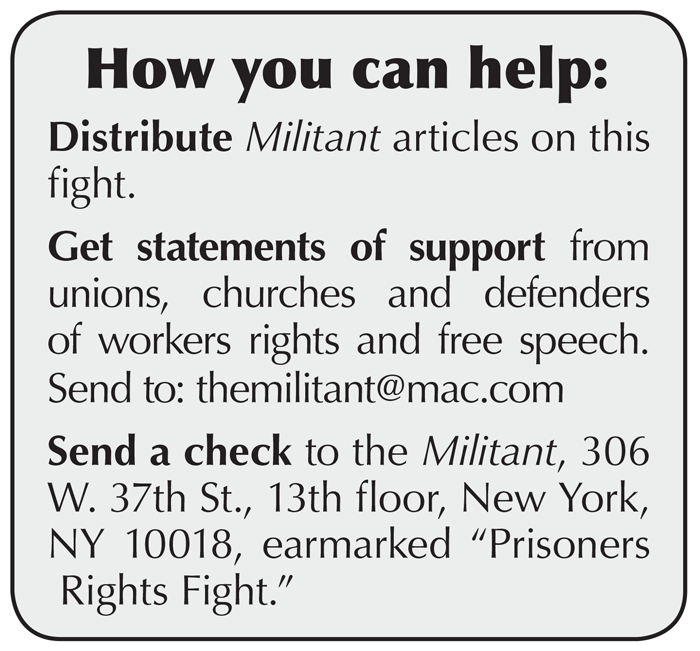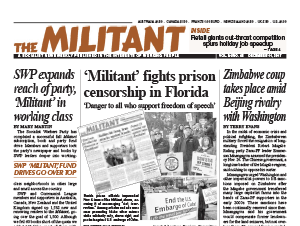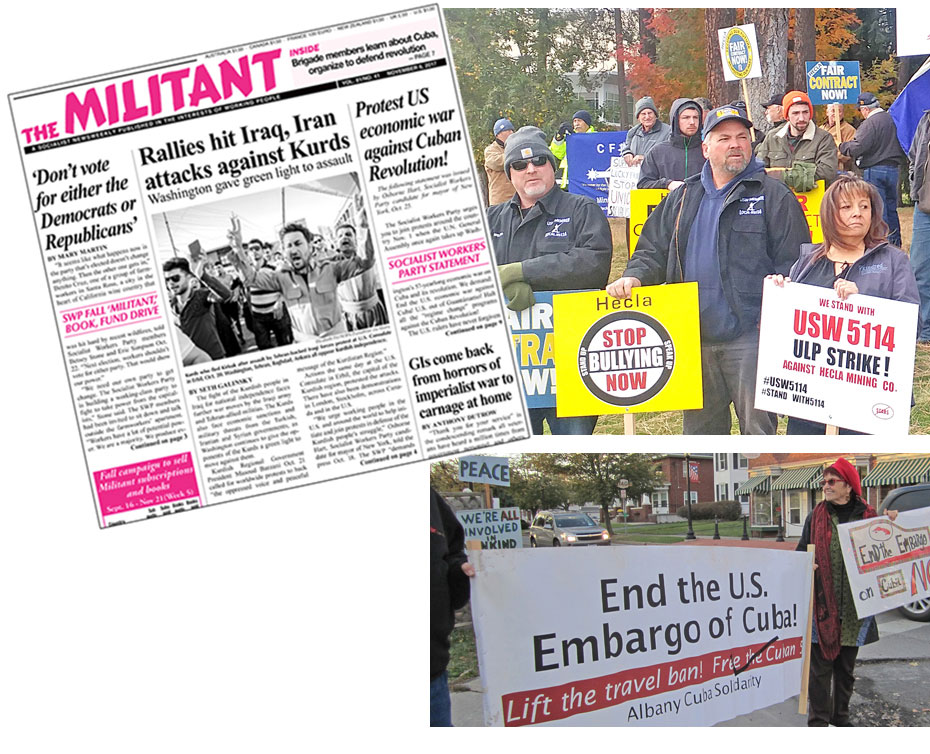And unlike most previous attempts by Florida authorities to block the Militant, which singled out one or another article, the latest attempt alleges that the paper itself “encourages protesting and group disruption.”
Almost all the impoundments from 2013 to 2016 were overturned when the Militant challenged them. But so far this year, the Florida prison systems’ Literature Review Committee has upheld nearly half.
David Goldstein, the Militant’s attorney from the prominent constitutional rights law firm Rabinowitz, Boudin, Standard, Krinsky and Lieberman, informed the committee that the paper is challenging the prison’s censorship. Already supporters of freedom of the press and the political rights of prisoners are speaking out in support of the appeal.
“Workers behind bars have a constitutional right to read material of their choosing,” wrote the New York Riverside Church Prison Ministry, calling on Florida officials to reverse the impoundments in a Nov. 27 letter to the Literature Review Committee. “To attempt to silence the Militant’s voice represents a danger to anyone who cares about freedom of thought, inquiry and expression.”
According to Florida regulations, once one prison bans an issue, all the rest follow suit. The latest impoundment was ordered by officials at Jefferson Correctional Institution in Monticello. They claimed the Militant is “dangerously inflammatory in that it advocates or encourages riot, insurrection,” and that it “encourages activities which may lead to the use of physical violence.”
The prison censors don’t identify which articles they say offend their guidelines, but headlines on the four pages they cite demonstrate the absurdity of the charges:
“Protest US Economic War Against Cuban Revolution!” “GIs Come Back From Horrors of Imperialist War to Carnage at Home,” “Don’t Vote for Either the Democrats or Republicans,” “Working-Class Solidarity Got Many Out of Harm’s Way in Calif. Wildfire,” “Walmart, Amazon Bosses Fight for Profits, Make Workers Pay,” “Brigadistas Learn About Cuba, Organize to Defend Revolution” and “Oscar López: ‘Cuba Gives Us Best Example of Resistance.’”
These pages also feature ads promoting a “Rally and march for silver miners on strike” in Coeur d’Alene, Idaho, and a “Rally to defend Cuban Revolution at the United Nations” in New York.

What is it here that prison officials consider “dangerously inflammatory?”
Florida officials also impounded the Oct. 30 issue, citing an article that reported on the Militant’s challenge to other issues of the paper they barred, even though the Literature Review Committee had said previous impoundments on this basis were invalid and ordered those issues delivered to inmate subscribers.
Over the last year the Militant has won broad support for its fight against censorship. Among the groups that have spoken out are the American Civil Liberties Union of Florida, PEN America, the National Lawyers Guild, Amnesty International USA and the American Friends Service Committee.
“In the midst of the deepening capitalist economic crisis, working people need a paper that tells the truth and that explains the need to unite and organize independently of the bosses’ parties,” Militant editor John Studer said. “Our fellow workers behind bars are part of this world. They have a right to read news about the deteriorating conditions workers face today and their efforts to change them, to consider different views and to form their own opinions.”
“This is a question of the freedom of the press,” Studer said, “and also of the basic human rights of prisoners.” He called on all supporters of political rights to join the fight against censorship.
|
Printer-friendly version of this article |








 click here for information and literature from the Socialist Workers Party 2016 campaign
click here for information and literature from the Socialist Workers Party 2016 campaign a magazine of Marxist politics and theory from 1934 to the present
a magazine of Marxist politics and theory from 1934 to the present an international news magazine published from 1963 to 1986
an international news magazine published from 1963 to 1986 a socialist magazine in Spanish published from 1977 to 2005
a socialist magazine in Spanish published from 1977 to 2005




